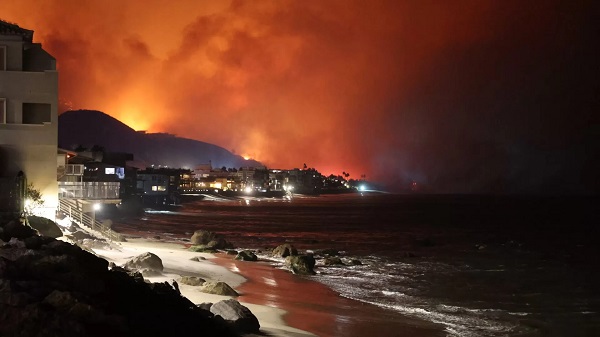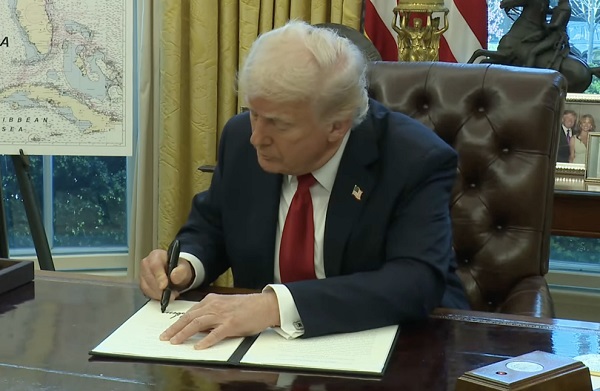You are reading The Rattler, a weekly newsletter from J.D. Tuccille and Reason. If you care about government overreach and tangible threats to everyday liberty, sign up for The Rattler. It’s free. Unsubscribe any time.
As I write on Sunday, January 12, Los Angeles Fire Department Chief Kristin Crowley is pointing fingers at Mayor Karen Bass for stripping the department of key resources and funding, California Gov. Gavin Newsom vows to find out the reason fire hydrants went dry during efforts to battle the devastating blazes, and everybody wants to know why a major reservoir in Pacific Palisades was empty and offline for a year. When faced with hard questions, state and local officials including Bass and Newsom are practicing more impressive dodging and weaving than we saw during the Mike Tyson–Jake Paul fight.
But that dodging and weaving can’t erase the serious missteps that led to this very predictable moment.
Regulatory Delays with Devastating Consequences
“Proactive measures like thinning and prescribed burns can significantly reduce wildfire risks, but such projects are often tied up for years in environmental reviews or lawsuits,” Shawn Regan, vice president of research at the Montana-based Property and Environment Research Center (PERC), told me by email. “In places like California, these delays have had devastating consequences, with restoration work stalled while communities and ecosystems burn to the ground. Addressing the wildfire crisis will require bold policy changes to streamline reviews, cut red tape, and ensure these projects can move forward before it’s too late.”
For example, as I’ve written before, under the requirements of the National Environmental Policy Act (NEPA), members of the public and activist groups can formally object to proposed actions, such as forest thinning, through a bureaucratic process that slows matters to a crawl. If that doesn’t deliver results, they move their challenges to the courts and litigate them into submission. The California Environmental Quality Act (CEQA) creates additional red-tape hurdles at the state level, imposing years of delays.
Regan and his colleagues at PERC have frequently addressed this subject—presciently, you might say, except that everybody except California government officials saw this moment coming.
Wasted Water
“From water rules that cause shortages to red tape that fuels extreme wildfires, state and federal policies have deepened California’s most pressing environmental challenges,” Regan wrote in 2023. “As a result, the Golden State now confronts the consequences of these choices, with destructive effects on its natural landscapes, its economy, and its residents.”
“Water in California is often allocated not through markets but through inflexible, acrimonious, and ineffective political processes,” he added. He called out subsidized water—especially, though not exclusively, for agricultural use—which divorces supply from demand. Also at fault are “use it or lose it” rules which discourage water conservation lest allocations be reduced in years to come.
When it comes to sourcing and storing water, “Officials have delayed or rejected proposals to build desalination plants that convert saltwater into drinking water,” even as “the state hasn’t built a significant new reservoir in more than 40 years,” leaving water from rains and floods to flow away, uncaptured. “Nearly all of the water that gushed through the Sacramento–San Joaquin Delta was flushed out to sea in an effort to comply with state and federal environmental regulations aimed at protecting the delta smelt.”
Badly Managed Forests
Also important, California has failed to effectively manage its forests. “Decades of fire suppression, coupled with a hands-off approach to forest management, have created dangerous fuel loads (the amount of combustible material in a particular area),” Regan wrote. Ominously, he added: “With conditions like this, all it takes to ignite an inferno is a spark and some wind.”
In 2020, Elizabeth Weil of ProPublica also named California’s forest management as a serious concern.
“Academics believe that between 4.4 million and 11.8 million acres burned each year in prehistoric California,” Weil noted. “Between 1982 and 1998, California’s agency land managers burned, on average, about 30,000 acres a year. Between 1999 and 2017, that number dropped to an annual 13,000 acres.” She emphasized that “California would need to burn 20 million acres—an area about the size of Maine—to restabilize in terms of fire.”
As Weil summarized the issue, “We live in a Mediterranean climate that’s designed to burn, and we’ve prevented it from burning anywhere close to enough for well over a hundred years.”
The problem is that if you don’t let forests burn in a natural and healthy way while focusing fire suppression on human communities, you’re likely to get out-of-control conflagrations. In the absence of water to fight the resulting fires, you’ve lost any ability to manage the situation.
Reforms To Fix the Mess
In 2021, Holly Fretwell and Jonathan Wood of PERC published Fix America’s Forests: Reforms to Restore National Forests, recommending means to address wildfire risks in California and across the country. To claims that the wildfire problem is overwhelmingly one of climate change, they respond that a “study led by Forest Service scientists estimated that of four factors driving fire severity in the western United States, live fuel ‘was the most important,’ accounting for 53 percent of average relative influence, while climate accounted for 14 percent.” Climate matters, but other policy choices matter more.
Fretwell and Wood recommend restricting the scope of regulatory reviews that stands in the way of forest restoration, requiring that lawsuits against restoration projects be filed quickly, and excluding prescribed burns from carbon emissions calculations that can stand in the way of such projects.
They also want to expand markets for construction materials, fuel pellets, and other products that can be made from trees removed while clearing potential fuel. That would make forest restoration profitable and allow it to be handled, at least in part, by private industry. I’ve written about such efforts before, including a promising effort in Northern Arizona.
“There is broad agreement on the need for better forest management, but outdated policies and regulatory hurdles continue to delay critical restoration efforts,” Regan told me.
If government officials finally take these hard-learned lessons to heart and ease the process of providing and storing water, restoring forests, and fighting fires, Californians might be spared from future disasters. They seem poised to work with the incoming Trump administration on exactly that. But reforms will come too late for those who have already lost lives, homes, and businesses.


















